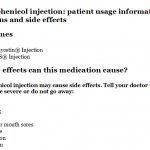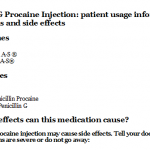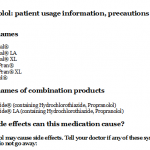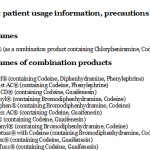
Aspirin: patient usage information, precautions and side effects
Tuesday, May 30, 2017 by Gregory Van Dyke
http://www.naturalnewsreference.com/2017-05-30-aspirin-patient-usage-information-precautions-and-side-effects.html
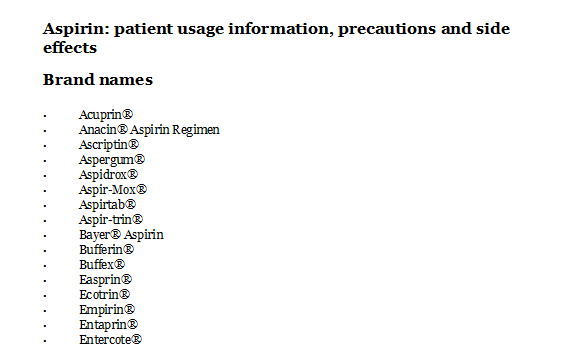
Aspirin: patient usage information, precautions and side effects
Brand names
-
Acuprin®
-
Anacin® Aspirin Regimen
-
Ascriptin®
-
Aspergum®
-
Aspidrox®
-
Aspir-Mox®
-
Aspirtab®
-
Aspir-trin®
-
Bayer® Aspirin
-
Bufferin®
-
Buffex®
-
Easprin®
-
Ecotrin®
-
Empirin®
-
Entaprin®
-
Entercote®
-
Fasprin®
-
Genacote®
-
Gennin-FC®
-
Genprin®
-
Halfprin®
-
Magnaprin®
-
Miniprin®
-
Minitabs®
-
Ridiprin®
-
Sloprin®
-
Uni-Buff®
-
Uni-Tren®
-
Valomag®
-
Zorprin®
Brand names of combination products
-
Alka-Seltzer® (containing Aspirin, Citric Acid, Sodium Bicarbonate)
-
Alka-Seltzer® Extra Strength (containing Aspirin, Citric Acid, Sodium Bicarbonate)
-
Alka-Seltzer® Morning Relief (containing Aspirin, Caffeine)
-
Alka-Seltzer® Plus Flu (containing Aspirin, Chlorpheniramine, Dextromethorphan)
-
Alka-Seltzer® PM (containing Aspirin, Diphenhydramine)
-
Alor® (containing Aspirin, Hydrocodone)
-
Anacin® (containing Aspirin, Caffeine)
-
Anacin® Advanced Headache Formula (containing Acetaminophen, Aspirin, Caffeine)
-
Aspircaf® (containing Aspirin, Caffeine)
-
Axotal® (containing Aspirin, Butalbital)
-
Azdone® (containing Aspirin, Hydrocodone)
-
Bayer® Aspirin Plus Calcium (containing Aspirin, Calcium Carbonate)
-
Bayer® Aspirin PM (containing Aspirin, Diphenhydramine)
-
Bayer® Back and Body Pain (containing Aspirin, Caffeine)
-
BC Headache (containing Aspirin, Caffeine, Salicylamide)
-
BC Powder (containing Aspirin, Caffeine, Salicylamide)
-
Damason-P® (containing Aspirin, Hydrocodone)
-
Emagrin® (containing Aspirin, Caffeine, Salicylamide)
-
Endodan® (containing Aspirin, Oxycodone)
-
Equagesic® (containing Aspirin, Meprobamate)
-
Excedrin® (containing Acetaminophen, Aspirin, Caffeine)
-
Excedrin® Back & Body (containing Acetaminophen, Aspirin)
-
Goody’s® Body Pain (containing Acetaminophen, Aspirin)
-
Levacet® (containing Acetaminophen, Aspirin, Caffeine, Salicylamide)
-
Lortab® ASA (containing Aspirin, Hydrocodone)
-
Micrainin® (containing Aspirin, Meprobamate)
-
Momentum® (containing Aspirin, Phenyltoloxamine)
-
Norgesic® (containing Aspirin, Caffeine, Orphenadrine)
-
Orphengesic® (containing Aspirin, Caffeine, Orphenadrine)
-
Panasal® (containing Aspirin, Hydrocodone)
-
Percodan® (containing Aspirin, Oxycodone)
-
Robaxisal® (containing Aspirin, Methocarbamol)
-
Roxiprin® (containing Aspirin, Oxycodone)
-
Saleto® (containing Acetaminophen, Aspirin, Caffeine, Salicylamide)
-
Soma® Compound (containing Aspirin, Carisoprodol)
-
Soma® Compound with Codeine (containing Aspirin, Carisoprodol, Codeine)
-
Supac® (containing Acetaminophen, Aspirin, Caffeine)
-
Synalgos-DC® (containing Aspirin, Caffeine, Dihydrocodeine)
-
Talwin® Compound (containing Aspirin, Pentazocine)
-
Vanquish® (containing Acetaminophen, Aspirin, Caffeine)
Other names
-
Acetylsalicylic acid
-
ASA
What side effects can this medication cause?
Aspirin may cause side effects. Tell your doctor if any of these symptoms are severe or do not go away:
-
nausea
-
vomiting
-
stomach pain
-
heartburn
Some side effects can be serious. If you experience any of the following symptoms, call your doctor immediately:
-
hives
-
rash
-
swelling of the eyes, face, lips, tongue, or throat
-
wheezing or difficulty breathing
-
hoarseness
-
fast heartbeat
-
fast breathing
-
cold, clammy skin
-
ringing in the ears
-
loss of hearing
-
bloody vomit
-
vomit that looks like coffee grounds
-
bright red blood in stools
-
black or tarry stools
Aspirin may cause other side effects. Call your doctor if you experience any unusual problems while you are taking this medication.
If you experience a serious side effect, you or your doctor may send a report to the Food and Drug Administration’s (FDA) MedWatch Adverse Event Reporting program online (http://www.fda.gov/Safety/MedWatch) or by phone (1-800-332-1088).
[Posted 06/06/2016]
AUDIENCE: Consumer
ISSUE: The FDA is warning consumers about the risk of serious bleeding when using nonprescription, also known as over-the-counter or OTC, aspirin-containing antacid products to treat heartburn, sour stomach, acid indigestion, or upset stomach. Many other products for these conditions are available that do not contain aspirin.
These widely used products already contain warnings about this bleeding risk on their labels; however, we are continuing to receive reports of this serious safety issue. As a result, we will continue to evaluate this safety concern and plan to convene an advisory committee of external experts to provide input regarding whether additional FDA actions are needed.
BACKGROUND: OTC aspirin-antacid products are sold under various trade names, including Alka-Seltzer Original, Bromo Seltzer, Medique Medi Seltzer, Picot Plus Effervescent, Vida Mia Pain Relief, Winco Foods Effervescent Antacid and Pain Relief, and Zee-Seltzer Antacid and Pain Reliever. They are also available as generic products.
In 2009, a warning about the risk of serious bleeding was added to the labels of all OTC products that contain NSAIDs, including aspirin-containing antacid products. However, a search of the FDA Adverse Event Reporting System (FAERS) database identified eight cases of serious bleeding events associated with these products after the warning was added. All of these patients were hospitalized. Patients had underlying conditions such as the risk factors above that put them at greater risk for developing serious bleeding events (see Data Summary at http://www.fda.gov/Drugs/DrugSafety/ucm504328.htm). The FAERS database includes only reports submitted to FDA so there are likely additional cases about which we are unaware.
RECOMMENDATION: Consumers should always read the Drug Facts label carefully when purchasing or taking an OTC product to treat heartburn, acid indigestion, or sour or upset stomach. If the product contains aspirin, consider whether you should choose a product without aspirin to relieve your symptoms.
Aspirin is a commonly used pain reducer and fever reducer. It is a nonsteroidal anti-inflammatory drug (NSAID) that can increase the risk of bleeding, including in the stomach and gastrointestinal (GI) tract. Ask your pharmacist if you need help reading the Drug Facts label.
If you have one or more of the following risk factors, you may have a higher chance of serious bleeding when taking aspirin-containing antacid products:
-
Are 60 years or older
-
Have a history of stomach ulcers or bleeding problems
-
Take a blood-thinning or steroid medicine
-
Take other medicines containing NSAIDs such as ibuprofen or naproxen
-
Drink three or more alcoholic drinks every day
Taking more of these medicines than the amount recommended or for a longer period than recommended will increase the risk of serious bleeding.
For more information visit the FDA website at: http://www.fda.gov/Safety/MedWatch/SafetyInformation and http://www.fda.gov/Drugs/DrugSafety.
Why is this medication prescribed?
Prescription aspirin is used to relieve the symptoms of rheumatoid arthritis (arthritis caused by swelling of the lining of the joints), osteoarthritis (arthritis caused by breakdown of the lining of the joints), systemic lupus erythematosus (condition in which the immune system attacks the joints and organs and causes pain and swelling) and certain other rheumatologic conditions (conditions in which the immune system attacks parts of the body). Nonprescription aspirin is used to reduce fever and to relieve mild to moderate pain from headaches, menstrual periods, arthritis, colds, toothaches, and muscle aches. Nonprescription aspirin is also used to prevent heart attacks in people who have had a heart attack in the past or who have angina (chest pain that occurs when the heart does not get enough oxygen). Nonprescription aspirin is also used to reduce the risk of death in people who are experiencing or who have recently experienced a heart attack. Nonprescription aspirin is also used to prevent ischemic strokes (strokes that occur when a blood clot blocks the flow of blood to the brain) or mini-strokes (strokes that occur when the flow of blood to the brain is blocked for a short time) in people who have had this type of stroke or mini-stroke in the past. Aspirin will not prevent hemorrhagic strokes (strokes caused by bleeding in the brain). Aspirin is in a group of medications called salicylates. It works by stopping the production of certain natural substances that cause fever, pain, swelling, and blood clots.
Aspirin is also available in combination with other medications such as antacids, pain relievers, and cough and cold medications. This monograph only includes information about the use of aspirin alone. If you are taking a combination product, read the information on the package or prescription label or ask your doctor or pharmacist for more information.
How should this medicine be used?
Prescription aspirin comes as an extended-release ( long-acting) tablet. Nonprescription aspirin comes as a regular tablet, a delayed-release (releases the medication in the intestine to prevent damage to the stomach) tablet, a chewable tablet, powder, and a gum to take by mouth and a suppository to use rectally. Prescription aspirin is usually taken two or more times a day. Nonprescription aspirin is usually taken once a day to lower the risk of a heart attack or stroke. Nonprescription aspirin is usually taken every 4 to 6 hours as needed to treat fever or pain. Follow the directions on the package or prescription label carefully, and ask your doctor or pharmacist to explain any part you do not understand. Take aspirin exactly as directed. Do not take more or less of it or take it more often than directed by the package label or prescribed by your doctor.
Swallow the extended-release tablets whole with a full glass of water. Do not break, crush, or chew them.
Swallow the delayed-release tablets with a full glass of water.
Chewable aspirin tablets may be chewed, crushed, or swallowed whole. Drink a full glass of water, immediately after taking these tablets.
Ask a doctor before you give aspirin to your child or teenager. Aspirin may cause Reye’s syndrome (a serious condition in which fat builds up on the brain, liver, and other body organs) in children and teenagers, especially if they have a virus such as chicken pox or the flu.
If you have had oral surgery or surgery to remove your tonsils in the last 7 days, talk to your doctor about which types of aspirin are safe for you.
Delayed-release tablets begin to work some time after they are taken. Do not take delayed-release tablets for fever or pain that must be relieved quickly.
Stop taking aspirin and call your doctor if your fever lasts longer than 3 days, if your pain lasts longer than 10 days, or if the part of your body that was painful becomes red or swollen. You may have a condition that must be treated by a doctor.
To insert an aspirin suppository into the rectum, follow these steps:
-
Remove the wrapper.
-
Dip the tip of the suppository in water.
-
Lie down on your left side and raise your right knee to your chest. (If you are left-handed, lie on your right side and raise your left knee.)
-
Using your finger, insert the suppository into the rectum, about 1/2 to 1 inch (1.25 to 2.5 centimeters) in infants and children and 1 inch (2.5 centimeters) in adults. Hold it in place for a few moments.
-
Do not stand up for at least 15 minutes. Then wash your hands thoroughly and resume your normal activities.
Other uses for this medicine
Aspirin is also sometimes used to treat rheumatic fever (a serious condition that may develop after a strep throat infection and may cause swelling of the heart valves) and Kawasaki disease (an illness that may cause heart problems in children). Aspirin is also sometimes used to lower the risk of blood clots in patients who have artificial heart valves or certain other heart conditions and to prevent certain complications of pregnancy.
What special precautions should I follow?
Before taking aspirin,
-
tell your doctor and pharmacist if you are allergic to aspirin, other medications for pain or fever, tartrazine dye, or any other medications.
-
tell your doctor and pharmacist what prescription and nonprescription medications, vitamins, nutritional supplements, and herbal products you are taking or plan to take. Be sure to mention any of the following: acetazolamide (Diamox); angiotensin-converting enzyme (ACE) inhibitors such as benazepril (Lotensin), captopril (Capoten), enalapril (Vasotec), fosinopril (Monopril), lisinopril (Prinivil, Zestril), moexipril (Univasc), perindopril, (Aceon), quinapril (Accupril), ramipril (Altace), and trandolapril (Mavik); anticoagulants (‘blood thinners’) such as warfarin (Coumadin) and heparin; beta blockers such as atenolol (Tenormin), labetalol (Normodyne), metoprolol (Lopressor, Toprol XL), nadolol (Corgard), and propranolol (Inderal); diuretics (‘water pills’); medications for diabetes or arthritis; medications for gout such as probenecid and sulfinpyrazone (Anturane); methotrexate (Trexall); other nonsteroidal anti-inflammatory drugs (NSAIDs) such as naproxen (Aleve, Naprosyn); phenytoin (Dilantin); and valproic acid (Depakene, Depakote). Your doctor may need to change the doses of your medications or monitor you more carefully for side effects.
-
if you are taking aspirin on a regular basis to prevent heart attack or stroke, do not take ibuprofen (Advil, Motrin) to treat pain or fever without talking to your doctor. Your doctor will probably tell you to allow some time to pass between taking your daily dose of aspirin and taking a dose of ibuprofen.
-
tell your doctor if you have or have ever had asthma, frequent stuffed or runny nose, or nasal polyps (growths on the linings of the nose). If you have these conditions, there is a risk that you will have an allergic reaction to aspirin. Your doctor may tell you that you should not take aspirin.
-
tell your doctor if you often have heartburn, upset stomach, or stomach pain and if you have or have ever had ulcers, anemia, bleeding problems such as hemophilia, or kidney or liver disease.
-
tell your doctor if you are pregnant, especially if you are in the last few months of your pregnancy, you plan to become pregnant, or you are breast-feeding. If you become pregnant while taking aspirin, call your doctor. Aspirin may harm the fetus and cause problems with delivery if it is taken during the last few months of pregnancy.
-
if you are having surgery, including dental surgery, tell the doctor or dentist that you are taking aspirin.
-
if you drink three or more alcoholic drinks every day, ask your doctor if you should take aspirin or other medications for pain and fever.
What special dietary instructions should I follow?
Unless your doctor tells you otherwise, continue your normal diet.
What should I do if I forget a dose?
If your doctor has told you to take aspirin on a regular basis and you miss a dose, take the missed dose as soon as you remember it. However, if it is almost time for the next dose, skip the missed dose and continue your regular dosing schedule. Do not take a double dose to make up for a missed one.
What should I know about storage and disposal of this medication?
Keep this medication in the container it came in, tightly closed, and out of reach of children. Store it at room temperature and away from excess heat and moisture (not in the bathroom). Store aspirin suppositories in a cool place or in a refrigerator. Throw away any medication that is outdated or no longer needed and any tablets that have a strong vinegar smell. Talk to your pharmacist about the proper disposal of your medication.
In case of emergency/overdose
In case of overdose, call your local poison control center at 1-800-222-1222. If the victim has collapsed or is not breathing, call local emergency services at 911.
Symptoms of overdose may include:
-
burning pain in the throat or stomach
-
vomiting
-
decreased urination
-
fever
-
restlessness
-
irritability
-
talking a lot and saying things that do not make sense
-
fear or nervousness
-
dizziness
-
double vision
-
uncontrollable shaking of a part of the body
-
confusion
-
abnormally excited mood
-
hallucination (seeing things or hearing voices that are not there)
-
seizures
-
drowsiness
-
loss of consciousness for a period of time
What other information should I know?
Keep all appointments with your doctor.
If you are taking prescription aspirin, do not let anyone else take your medication. Ask your pharmacist any questions you have about refilling your prescription.
It is important for you to keep a written list of all of the prescription and nonprescription (over-the-counter) medicines you are taking, as well as any products such as vitamins, minerals, or other dietary supplements. You should bring this list with you each time you visit a doctor or if you are admitted to a hospital. It is also important information to carry with you in case of emergencies.
Why is this medication prescribed?
How should this medicine be used?
What special precautions should I follow?
What special dietary instructions should I follow?
What should I do if I forget a dose?
What side effects can this medication cause?
What should I know about storage and disposal of this medication?
What other information should I know?
Tagged Under: Tags: chemical medicine, medication, Pharma, Prescription Medicine

